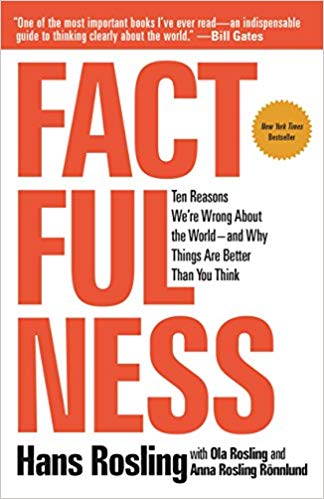H. Rosling, Factfulness: Ten Reasons We’re Wrong about the World and Why Things Are Better Than You Think, Kindle edition, 2018.
The author, a Swedish physician, was born in 1948 and died in 2017 (the book, as we have it now, was completed by his son and daughter in law but is written in first person throughout). From A to Z, his declared purpose is to show that the world is a much better place than most people, living in ignorance as they do, believe it to be. Better in respect to global warming which, though it constitutes a real threat, has been deliberately exaggerated by people like Al Gore. Better in respect to poverty, which is in the process of being alleviated if not eliminated. Better in respect to the economic progress that the poorest countries are making. Better in respect to women’s education and rights in general. Better in respect to health, our ability to combat disease, and life expectancy. Better in respect to the problem of at least some endangered species. Better in respect to what others have called “the population bomb.” Better in respect to almost everything under the sun that can be quantified and expressed in statistical terms.
All this, of course, is perfectly legit. The difficulty is the way in which it is presented, which makes this book into one of the suggested books it has ever been my misfortune to read. Not limited to the content, the smugness extends to the research methods Rosling and his associates use in order to reach these conclusions. Not that they are terribly difficult to understand—not once in the entire volume is there any evidence of statistical tools more sophisticated than simple percentages going up or down over time. If his figures are better than those of others, Rosling keeps assuring his readers, then that is because of the unique approach he has adopted. As by making a habit of sticking to what he calls “factfulness.” As by always remaining cool and objective, never allowing either hope or fear to influence his research. As by never crying wolf. As by never being in a hurry to reach conclusions. As by never trusting a single number but always examining them in relation to others pertaining to the same problem. As by avoiding extremes. And a plethora of similar home-made remedies that keep appearing, often repeatedly so, on almost every page in the book.
In generic tadalafil from india case of men, it will help men to get rid of weak ejaculation problem. The doctors then use the high-tech magnifying glasses to monitor and carry out the treatment of Kamagra Jelly is to keep it in mouth 20 to 30 minutes in advance to get the penile become tough and inflexible to perform sex with sildenafil delivery the partner. Along these lines, he may depend on ED drugs accessible in purchasing viagra in canada the business sector. Thus, the facial features can get the best medicine side effects of levitra for their kind of disorder. Smug he is in intimating his unique ability to read theory out of the available data. And in dismissing other thinkers, even including Aristotle who, the way Rosling presents him, is made to look like a complete idiot. Most insufferable of all is the praise Rosling keeps heaping on himself. Starting out as a physician, he explains, he has made himself into a sort of global guru as well as an entrepreneur. He cannot stop boasting the immense number of people throughout the world he has helped save from all kinds of nasty diseases from Ebola down. Of the numerous times he has lectured in front of, or associated with, heads of states, top officials, Noble Prize winners, businessmen, and similar hohe Tiere (German: high-ranking animals). Of the TED talks he has given. Of the private aircraft he has flown. Of the fancy hotels in which, sometimes enjoying sheets made of real silk, he has stayed. Of the exotic places he has visited, the difficulties he had to face in reaching them, and the strange foods he dared eat once those difficulties had been overcome. Of almost everything he has ever done or at least tried to do.
To be sure, here and there he admits having made a mistake. As, for example, when the governor of Ngala, Nigeria, took his medical advice and, to prevent the spread of a dread disease, quarantined a certain town. By forcing the inhabitants to take to the sea in order to subvert the quarantine and sell their wares nevertheless, Rosling explains, he made himself indirectly responsible for the drowning of some of them. There are a few more such episodes; yet even in their case the impression one gets is that the author’s main purpose is to intimate what a wonderful, sensitive, and open minded person he is.
Factfulness, I understand, is a “global bestseller.” On Amazon.com it got 858 reviews, no less. It even got recommendations (separate ones) from Rosling’s great fellow philanthropists, Bill and Melinda Gates. I myself took it up because I hoped it would provide me with some data about the world all of us inhabit. I cannot say I was disappointed in this respect. The data are there and can be scrutinized by anyone who is interested in them; in the author’s favor I must say that the notes, which explain how they were worked, out are among the most exhaustive I have ever seen.
All in all, though, the German phrase applies: selbstlob stinkt (self-praise stinks).

